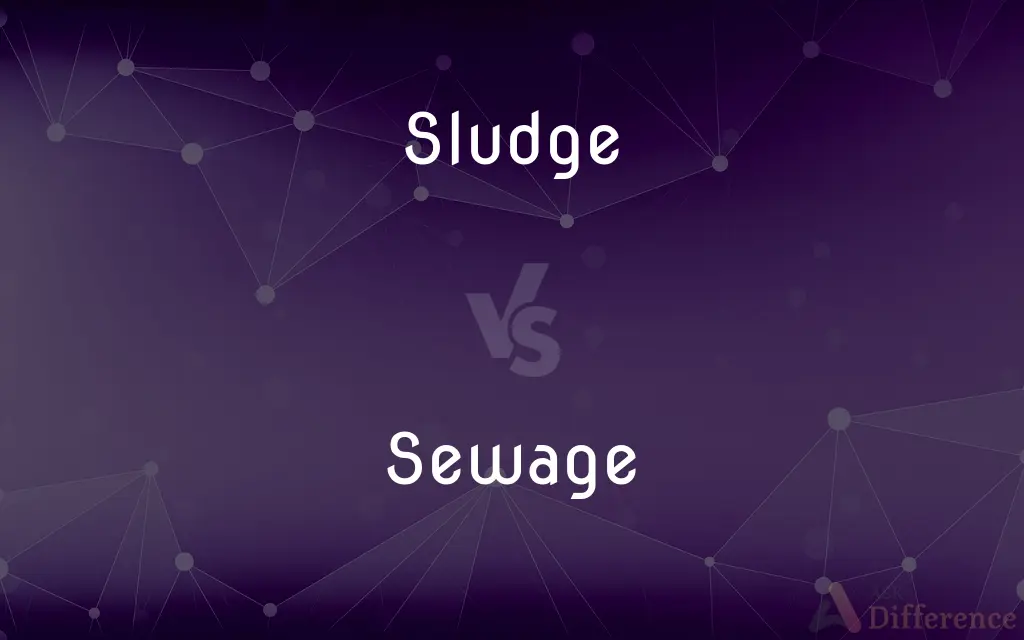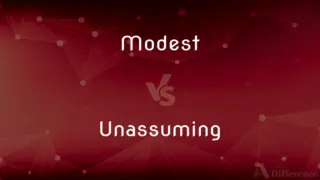Sludge vs. Sewage — What's the Difference?
By Tayyaba Rehman & Fiza Rafique — Updated on February 24, 2024
Sludge is a semi-solid waste byproduct from sewage treatment, while sewage refers to the waste water and contents flowing through sewer systems.

Difference Between Sludge and Sewage
Table of Contents
ADVERTISEMENT
Key Differences
Sludge results from the sedimentation process in sewage treatment plants, comprising organic and inorganic materials, pathogens, and chemicals. It's a concentrated form of waste that has been partially treated to reduce its volume and toxicity, requiring further processing or disposal. Sewage, on the other hand, is the broader term for waste water that includes household, industrial, and stormwater runoff. It contains a wide variety of contaminants, including bodily wastes, food scraps, oils, and chemicals, and is transported through sewer systems to treatment facilities.
Sludge is a specific byproduct of the sewage treatment process, sewage encompasses all types of waste water, regardless of its source or composition. The treatment of sewage aims to remove harmful substances and pathogens, converting it into effluent and sludge, with the latter requiring additional handling.
The management of sludge and sewage involves different processes and regulations. Sewage treatment focuses on removing contaminants to produce safe effluent and concentrated sludge. Sludge management may involve further treatment, such as digestion, dewatering, and disposal or use as fertilizer, depending on its composition and safety.
Understanding the distinction between sludge and sewage is crucial for environmental management and public health. Proper treatment and disposal of both are essential to prevent pollution and safeguard water quality, highlighting the importance of advanced wastewater treatment technologies.
Comparison Chart
Definition
Semi-solid byproduct from sewage treatment.
Waste water and contents from household, industrial, and stormwater sources.
ADVERTISEMENT
Composition
Concentrated organic and inorganic materials, pathogens, chemicals.
Bodily wastes, food scraps, oils, chemicals, water.
Origin
Results from the sedimentation process in sewage treatment.
Flows through sewer systems from various sources.
Treatment Process
Requires further processing or disposal after initial treatment.
Undergoes treatment to remove contaminants and produce effluent and sludge.
Environmental Impact
Managed through treatment, disposal, or use as fertilizer.
Requires comprehensive treatment to prevent pollution and protect water quality.
Compare with Definitions
Sludge
Contains concentrated waste materials.
Testing ensures the sludge contains safe levels of contaminants before land application.
Sewage
Contains a mix of contaminants.
Sewage treatment plants remove harmful substances from the water.
Sludge
Requires further processing.
Sludge is often dewatered to reduce its volume for disposal.
Sewage
Waste water from various sources.
Sewage systems collect water from residential and industrial areas.
Sludge
Can be used as fertilizer.
Treated sludge is sometimes applied to agricultural land as a soil conditioner.
Sewage
Flows through sewer systems.
The city's sewage is channeled to a central treatment facility.
Sludge
Managed to prevent environmental impact.
Proper sludge management is essential to avoid pollution.
Sewage
Treatment aims to protect water quality.
Effluent from sewage treatment is released into rivers, meeting environmental standards.
Sludge
Sludge is a semi-solid slurry that can be produced from a range of industrial processes, from water treatment, wastewater treatment or on-site sanitation systems. For example, it can be produced as a settled suspension obtained from conventional drinking water treatment, as sewage sludge from wastewater treatment processes or as fecal sludge from pit latrines and septic tanks.
Sewage
A suspension of water and solid waste, transported by sewers to be disposed of or processed.
Sludge
A semi-solid waste byproduct from sewage treatment.
The treatment plant processes tons of sludge annually for disposal.
Sewage
The contents of a sewer or drain; refuse liquids or matter carried off by sewers
Sewage
Undergoes comprehensive treatment.
Advanced filtration techniques are used to clean sewage effectively.
Sewage
Liquid and solid waste carried off in sewers or drains.
Sewage
Waste matter carried away in sewers or drains
Common Curiosities
How is sludge managed?
Sludge management involves treatment, disposal, or beneficial use, depending on its composition and safety.
What happens to sewage after treatment?
Treated sewage, or effluent, is typically discharged into water bodies, while meeting regulatory standards to protect water quality.
Can sludge be harmful?
Yes, if not properly treated, sludge can contain harmful pathogens and chemicals, posing environmental and health risks.
How does sewage become sludge?
During sewage treatment, solid waste settles out, forming sludge, while the remaining water is further treated and discharged.
Why is proper disposal of sludge and sewage crucial?
Proper disposal is essential to prevent pollution, safeguard water quality, and protect public health and the environment.
What is sludge?
Sludge is a semi-solid byproduct from the sewage treatment process, containing concentrated waste materials.
Can sludge be recycled?
Yes, treated sludge can be recycled as fertilizer or soil conditioner, provided it meets safety standards.
What is sewage?
Sewage refers to waste water and its contents, coming from household, industrial, and stormwater sources.
Why is sewage treatment important?
Sewage treatment is crucial for removing contaminants to protect public health and environmental water quality.
Is all sewage treated the same way?
No, sewage treatment can vary based on the source and composition of the sewage and the technology available at the treatment facility.
Share Your Discovery

Previous Comparison
Configurate vs. Configure
Next Comparison
Modest vs. UnassumingAuthor Spotlight
Written by
Tayyaba RehmanTayyaba Rehman is a distinguished writer, currently serving as a primary contributor to askdifference.com. As a researcher in semantics and etymology, Tayyaba's passion for the complexity of languages and their distinctions has found a perfect home on the platform. Tayyaba delves into the intricacies of language, distinguishing between commonly confused words and phrases, thereby providing clarity for readers worldwide.
Co-written by
Fiza RafiqueFiza Rafique is a skilled content writer at AskDifference.com, where she meticulously refines and enhances written pieces. Drawing from her vast editorial expertise, Fiza ensures clarity, accuracy, and precision in every article. Passionate about language, she continually seeks to elevate the quality of content for readers worldwide.














































